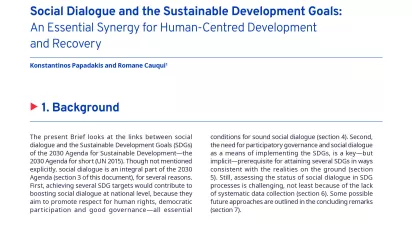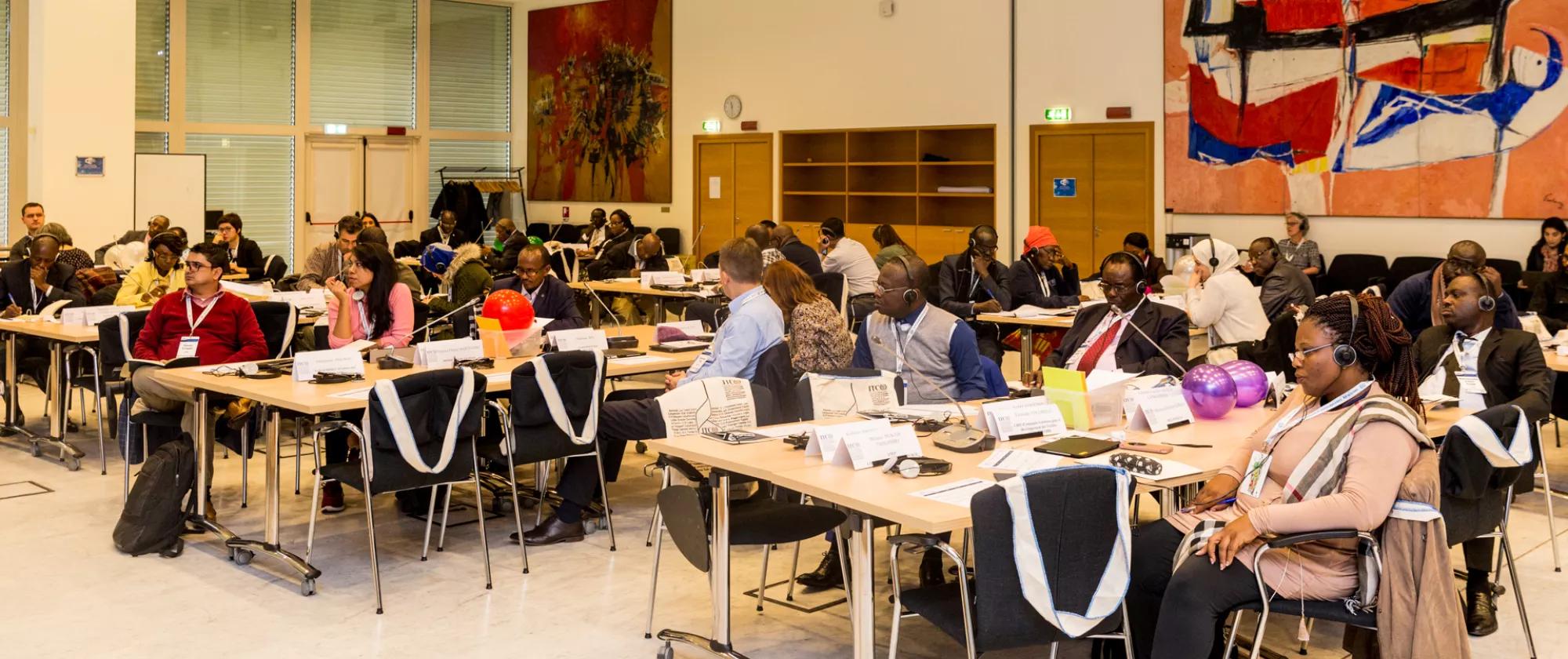
Topic portal
Social dialogue and tripartism
Effective social dialogue between governments, employers’ and workers’ organizations is key for advancing social justice, inclusive economic growth, improved wages and working conditions, and sustainable enterprises. As a tool of good governance, social dialogue creates conditions conducive to achieving decent work for all. It directly influences social peace, stability, and the overall governance of labour markets and economies.
Social dialogue plays a crucial role in achieving the Sustainable Development Goals (SDGs), particularly SDG 8 (decent work and economic growth), SDG 10 (reducing inequalities), and SDG 16 (peace, justice, and strong institutions).
Social dialogue includes:
- Negotiation, consultation and information exchange between and among governments, employers’ and workers’ organizations;
- Collective bargaining between employers/employers’ organizations and workers’ organizations;
- Dispute prevention and resolution; and
- Other approaches such as workplace cooperation, international framework agreements and social dialogue in the context of regional economic communities.
Preconditions for effective social dialogue:
- Strong, independent and representative employers' and workers’ organizations with the technical capacity to participate in social dialogue and access to relevant information;
- Respect for the fundamental rights of freedom of association and effective recognition of the right to collective bargaining;
- Political will, trust and commitment to engage in good faith in social dialogue by all the parties; and
- An enabling legal and institutional framework.
There is no “one size fits all” model of social dialogue that can be readily exported from one context to another; rather, it encompasses diverse global experiences and practices. Adapting social dialogue to specific contexts is crucial for ensuring full ownership by the parties involved and sustainability of the process. While practices vary between countries, ensuring freedom of association and effectively recognizing the right to collective bargaining are fundamental preconditions for effective social dialogue in any national context.
Some figures
158 countries
have ratified the ILO Tripartite Consultation (International Labour Standards) Convention, 1976 (No. 144).
85% of ILO Member States
have established a national social dialogue institution (NSDI).
Approximately 1 out of 2 workers
still lack coverage under the Fundamental Conventions on freedom of association and collective bargaining.
Key International Labour Standards related to social dialogue
Featured publications

Flagship report
Social Dialogue Report 2022: Collective bargaining for an inclusive, sustainable and resilient recovery

Policy brief
Social dialogue and the Sustainable Development Goals: An essential synergy for human-centred development and recovery

Policy brief
The role of social dialogue and tripartism in a just transition towards environmentally sustainable economies and societies for all

Thematic brief
Social dialogue for the transition from the informal to the formal economy
Publications
Workers’ organizations responding to the needs of refugees and other forcibly displaced persons
Technical Brief
National social dialogue institutions in selected countries of Central Asia and the Southern Caucasus: Closing the knowledge gap
Report of the ILO-AICESIS Joint International Conference 23–24 November 2023
The role of social dialogue and its institutions in combating inequalities in the world of work

Other ILO databases on social dialogue

Industrial Relations
The Legal Database on Industrial Relations (IRLex)

IRLex provides accessible country profiles and relevant legal texts on industrial relations across ILO Member States. It is a comprehensive resource on legislative and institutional frameworks governing industrial relations and a key tool for policy makers and advisors, government officials, representatives of workers’ and employers’ organizations, and legal and industrial relations specialists around the world.

Cross-Border Social Dialogue
The Repository of Knowledge on Cross-Border Social Dialogue

This new database serves to collect and disseminate information on cross-border social dialogue processes and initiatives developed between or among governments, workers and employers or their representatives, beyond national borders. It contains information organised under four broad categories of initiatives that generate cross-border social dialogue:
Resources for governments and social partners

Self-Assessment
Self-assessment method for social dialogue institutions (SAM-SDI)

Guide
Voice Matters: Consultation (Industrial and National Levels) Recommendation, 1960 (No. 113)

107th Session of the International Labour Conference (2018)
Resolution concerning the second recurrent discussion on social dialogue and tripartism

Social dialogue trainings
The International Training Centre of the ILO (ITCILO) offers a wide range of online and face-to-face training activities on social dialogue and tripartism
Featured training courses

Free Online Course
Social dialogue and industrial relations: A self-guided induction course

Free Online Course
The 2030 Agenda, Decent Work and Social Dialogue

Free Online Course
Industrial Relations Toolkit
News and articles

ILO Director-General emphasizes the positive potential of AI and the importance of proper management for an inclusive digital transition

TOR - Mapping Trade Unions Actions and Strategies on Climate Change and Just Transition in India
Contact us
The ILO supports Member States and constituents in enhancing their capacity to advocate for and promote effective and inclusive social dialogue and tripartism at all levels. We are committed to promoting the democratic involvement of key stakeholders in the governance of the world of work.
For more information or to reach out to our team and global network of experts, please contact us at [email protected].